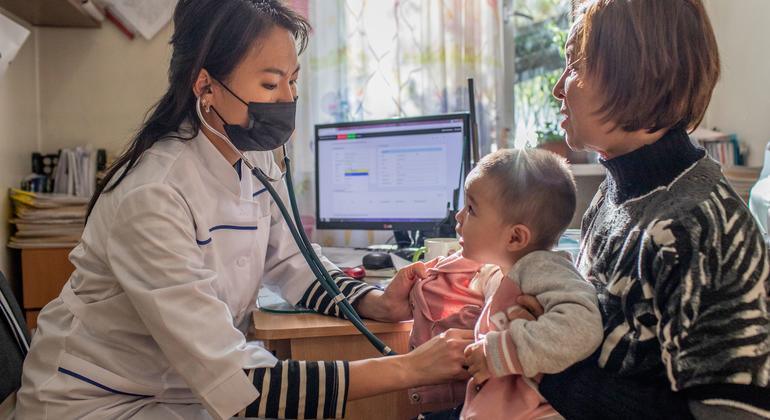“”The measles is back, and it is an alarm clock“Warned Dr. Hans Kluge, Regional Director of the World Health Organization (WHO) for the European region.
A total of 127,350 cases were reported in the region in 2024, the double of the number of cases reported for 2023 and the largest number since 1997, according to the analysis of the WHO and the United Nations Children’s Fund (UNICEF).
Among the most contagious viruses affecting people, measles can damage the immune system “erases” its memory in the way of fighting infections, leaving survivors vulnerable to other diseases.
In addition to hospitalization and death caused by complications, including pneumonia, encephalitis, diarrhea and dehydration, measles can also cause long -term debilitating complications such as blindness.
Death reported
According to the WHO, there have been around 107,500 deaths in measles, mainly among children not vaccinated or under vaccinated children under the age of five.
“”Measles remains a significant global threat“Said the United Nations agencies, pointing around 359,521 cases reported for 2024 in the world.
Current epidemics and deaths have been reported worldwide, especially in the Democratic Republic of Congo, the United States and countries in all other regions.
Based on the preliminary data received on March 6, 2025, a total of 38 deaths were reported in the European WHO region, which includes 53 countries in Europe and Central Asia.
Surge post-19
The region represented a third of all cases of measles worldwide in 2024.
The United Nations agencies underlined a resurgence in 2018 and 2019, with 89,000 and 106,000 cases respectively, after a period of decline since 1997, with 216,000 cases reported, which reached a minimum of 4,440 in 2016.
After a decline in immunization coverage during the COVVI-19 pandemic, cases increased considerably in 2023 and 2024, said the United Nations agencies, adding that vaccination rates in many countries have not yet returned to pre-pale levels, which increases the risk of outbreaks.
The transmission of the virus through borders and continents occurs regularly, and the epidemics of this highly infectious disease will occur wherever the virus finds pockets where vaccine levels are insufficient – especially children, they warned.
Currently, children under the age of five represented more than 40% of the cases reported in the region, and more than half of all cases required hospitalization.
Calls for an urgent government action
“”Cases of measles through Europe and Central Asia have skyrocketed in the past two years, pointing to the immunization coverage“Said Regina de Dominicis, regional director of UNICEF for Europe and Central Asia.
Just in 2023, 500,000 children in the region missed the first dose of the measles vaccine (MCV1) which should be given through routine vaccination services.
“To protect children from this deadly and debilitating disease, We need an urgent government action Including supported investments in health workers, “she said.
“ No health security ” without vaccines
Who is Dr. Kluge said “we cannot afford to lose ground” because the agency shapes its regional health strategy to tackle such serious problems.
“”Without high vaccination rate, there is no health security“Said Dr. Kluge.
“Each country must intensify efforts to reach subvacinated communities. The measles virus never rests and we can’t either. »»
In fact, vaccination is the best line of defense against the virus, insisted the United Nations agencies.
Hot spots of the epidemic
The latest analysis revealed that Romania has reported the greatest number of cases – 30,692 – in the region for 2024, followed by 28,147 in Kazakhstan.
At the same time, less than 80% of children eligible in Bosnia and Herzegovina, Montenegro, north of Macedonia and Romania were vaccinated with MCV1 in 2023.
In Bosnia and Herzegovina and Montenegro, the coverage rate for MCV1 has remained below 70% and 50% respectively in the past five years or more.
It is below the 95% coverage rate required to maintain the immunity of the herd, noted the United Nations agencies.
Catch -up campaigns
UNICEF and working with governments and health partners, including the European Union and the GAVI alliance, to prevent and respond to measles epidemics by engaging with communities.
Efforts include the training of health workers, strengthening vaccine programs and disease surveillance systems and the launch of catch -up campaigns in measles.
United Nations agencies call for governments with active epidemics to urgently intensify cases, contact contacts and carry out emergency vaccination campaigns.
Analyze deep causes
“It is imperative that countries analyze the deep causes of epidemics, process the weaknesses of their health systems and strategically use epidemiological data to identify and fill the coverage gaps,” said United Nations agencies.
Reaching hesitant parents and marginalized communities and attacking inequitable access to vaccines must be at the heart of all efforts, they added.
They have also warned that countries that do not have current measles epidemics should be prepared, in particular by identifying and filling its immunity gaps, strengthening and supporting public confidence in vaccines and maintaining solid health systems.




